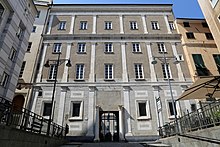Felice della Rovere
Felice della Rovere (* 1483 , † September 27, 1536 ) was an Italian Renaissance princess and the illegitimate daughter of Pope Julius II and Lucrezia Normanni.
Life
Felice della Rovere was most likely born in Rome . Her mother, Lucrezia Normanni, was one of the oldest families in town. Her father was Giuliano della Rovere , who later became Pope Julius II. Felice's mother later married an employee of Cardinal Girolamo Basso della Rovere , Bernardino de Cupis. Felice grew up in the Palazzo de Cupis in Piazza Navona in Rome.
After her father tried to overthrow the Borgia Pope Alexander VI in 1494 , Felice was taken to the Palazzo della Rovere in Savona , where she was safe from the retribution of the Borgia .
Her father married her for the first time between the ages of 14 and 15, and her husband died shortly afterwards. After Giuliano della Rovere became Pope in 1503 , he looked for a second husband for his daughter and arranged a marriage with Gian Giordano Orsini , the son of an influential Roman nobleman in the Orsini family . The marriage produced five children, four of whom reached adulthood. During the course of their marriage, Felice became a skillful businesswoman who managed her own estates and made her fortune particularly through the grain trade.
Her father used her diplomatic skills and often invited her to political banquets as the guest of honor and as the only woman present.
In 1510 the Pope planned to break France's influence in northern Italy . To achieve this, he dissolved the League of Cambrai , which had only been founded in 1508 as an alliance against the Republic of Venice , and replaced it with the Holy League . This was an alliance between the Papal States and Venice, in which France was not involved. After the Papal State of Bologna lost to France, the Pope entered into negotiations with Louis XII . In 1511 the Pope sent a delegation to France, which Orsini and Felice were leading. Felice stayed in France for two years for the negotiations.
Orsini died in 1517 , but had previously made Felice the guardian of all her children, including his son from his first marriage, as well as the administrator of the family property. Pope Leo X confirmed this position later.
This made Felice one of the most influential women of her time in Rome.
literature
- Carolin P. Murphy: The Pope's Daughter: The Extraordinary Life Of Felice della Rovere Oxford university Press, Oxford 2005, ISBN 978-0-571-22108-0
- Christine Shaw: Julius II. The Warrior Pope. Oxford 1993, ISBN 978-0-631-20282-0
| personal data | |
|---|---|
| SURNAME | Della Rovere, Felice |
| BRIEF DESCRIPTION | Italian Renaissance princess and illegitimate daughter of Pope Julius II. |
| DATE OF BIRTH | 1483 |
| PLACE OF BIRTH | uncertain: Rome |
| DATE OF DEATH | September 27, 1536 |

